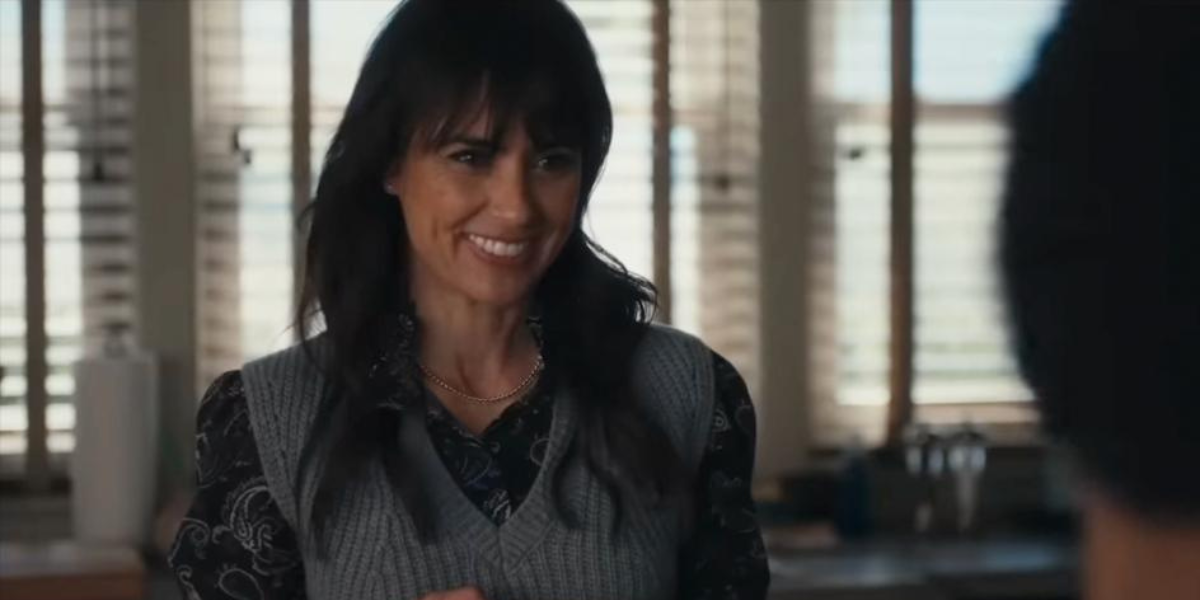This piece was written during the 2023 WGA and SAG-AFTRA strikes. Without the labor of the writers and actors who are currently on strike, series like Harlan Coben’s Shelter would not be possible, and Autostraddle is grateful for the artists who do this work.
This review of Harlan Coben’s Shelter contains spoilers, especially for the first three episodes, which are available to stream now.
Harlan Coben’s Shelter — a mouthful of a title that I assume was chosen either because 1. Mystery author Harlan Coben really wants you to know this show was based on one of his many books or 2. No one wanted to risk confusion with 2014’s Jennifer Connelly-starring movie Shelter — is a new Prime limited series about a New Jersey town plagued by disappearing children, murder, and butterfly imagery. It opens with teen boy Mickey Bolitar (Jaden Michael) witnessing the sudden death of his father, but when he arrives to his father’s hometown and meets a mysterious old woman in a giant old house, she tells him his dad isn’t dead. This strange announcement coupled with the fact that Mickey’s very new crush Ashley (Samantha Bugliaro) goes suddenly missing sends Mickey and his crew of misfit friends — nerdy sweetheart Spoon (Adrian Greensmith) and goth art girl Ema (Abby Corrigan) — on a twisty puzzlebox journey of uncovering town evils and many years of kids in danger.
Also, Didi Conn is here?! As a Grease gay, I’m thrilled.

The first three episodes drop on Prime today, and in its first installments, Harlan Coben’s Shelter struggles to make its central mystery all that, well, mysterious. There’s a ton of exposition doled out in droopy dialogue, and the tropes and twists the plot deploys are formulaic without any kind of specificity that might make it more engaging. I’m all about satisfying a formula, but this show doesn’t even follow a script all that well. Moments are confusing not because there’s genuine intrigue but because they’re clumsy or awkward. A sex trafficking ring factoring in heavily to the sprawling mystery feels unoriginal at best. And attempts to weave in history and make this a story about inherited and cyclical trauma remain uneven in the first half of the series.
In fact, the series is much better when it zooms in than when it’s zooming out to connect all the pieces of its conspiracy board with thin thread. One plotline involving Rachel (Sage Linder), a cheerleader Ashley befriends, actually does effectively convey the ripple effects of experiencing violence as a teen girl. The way she starts to unravel feels real and earned. Mickey’s relationship with his suicidal mother similarly has a lot of emotional depth and urgency to it. But the second characters start to talk in vague clichés about just how deep the trauma in this town runs, things veer into stilted and scripted territory that undoes some of that more intimate and quiet storytelling, thrusting the puzzlebox centerstage again when really all I want to do is get to know these characters better so I can care about what’s happening around them.
I am sure I sound biased when I say this, but the queer storytelling we get in the series makes for some of the best parts. In the first three episodes, we get the first whispers of a queer crush between Ema and her art classmate Whitney (Alexa Mareka). We’re also introduced early on to Mickey’s aunt Shira (Constance Zimmer, who I love so much, especially in the underrated series UnREAL), who he moves in with after his father’s death. Aunt Shira gets a surprise queer moment at the end of episode three, and I’d like to say I’m bored with sudden “queer reveals” that happen a few episodes into limited series and are played as twists, but nope, I’m sorry, this is a trope I actually can get behind! Or, at least, I can get behind it when its then followed up with layered and meaningful queer storytelling so that it doesn’t feel like the gay kissing is just for the sake of a surprise. And we do indeed get that in episode four, which will be out next week and which features some really lovely flashbacks pertaining to Shira’s queerness. In fact, its these flashbacks that are more compelling in what they say about the past swirling with the present than some of the more melodramatic missives the series makes about history repeating itself. Too often Harlan Coben’s Shelter shoves its themes in your face instead of just letting them simmer.
The more character-based moments — like those between Aunt Shira and her longtime best friend (Missy Pyle, who I also love!) — that inject Harlan Coben’s Shelter with much needed lifeforce. The series is so committed to revealing a new layer to its mystery every 12 seconds that you technically have to watch closely or risk missing something deemed crucial in subsequent scenes, but it struggles to actually provide a whole lot of reasons to make you want to watch closely outside of some of these more slowed down scenes that are less concerned with plot movement and more concerned with giving flesh to the story’s bones. And also, if you do miss something, chances are the characters will just remind you of it soon after. There’s a ton of narrative handholding to the script, yielding a series that’s trying so hard to be intense and mysterious but instead comes off overly simplistic and didactic.
What does feel exciting is that in a genre where we usually get just one isolated storyline involving queer women, this time we get two — and they’re very distinct from each other. Sure, that’s a low bar to clear, but it was enough to keep me watching the series, even when the overarching mystery wasn’t.



yes! you described exactly what was so frustrating about this show but also what made me unable to tear myself away (constance zimmer and missy pyle) (and the other queer storyline)